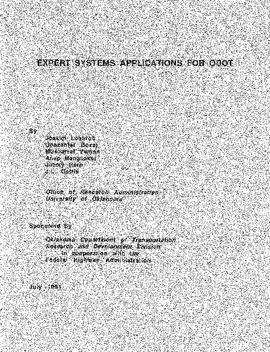| dc.description.abstract | Expert systems are "intelligent" computer programs which have the capabilities of reasoning, learning, and simulating human sensory capabilities. Solutions to many problems in transportation engineering which are not well structured as well as those which do not have an explicit numerical algorithmic solution, can benefit from using expert systems. Many state transportation agencies and research institutes have shown varying degrees of interest in the application of expert systems for various problem domains. The study presented in this report was aimed at critically reviewing the expert systems in transportation engineering with an idea of examining their suitability in the OOOT environment. The study included computerized search of the databases and a telephone survey of various research institutes and state transportation agencies. The literature was reviewed based on the following factors: problem domain, data required for the system, verification and validation, stage of development, future directions, use of shelVAI language, hardware requirements, and developer/ contact person. Despite their high potential for application, it was noted that, the utilization of expert systems in many transportation engineering problems has been rather limited. The reasons for such limited use could be attributed to the lack of technology transfer from the research arena to practice, difficulties involved in knowledge acquisition for certain problems, variation in practice from one agency to the other, lack of sufficient documentation and absence of effective economic treatise to the problem. It is, however, recommended that ODOT should plan on introducing expert sysytems to maintain its competitive edge. Such expert systems could help ODOT in restoring its institutional expertise in a cost effective manner and can also serve as a training tool. | |
